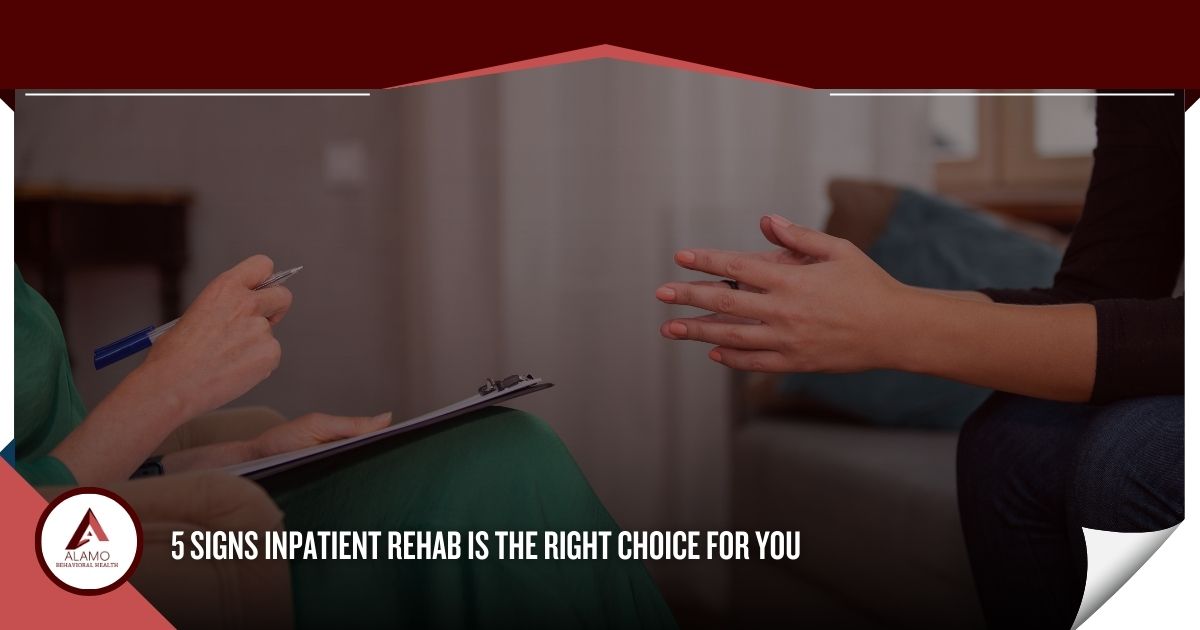Drug and alcohol addiction can wreak havoc on your life. Substance abuse can chip away at your physical health, emotional well-being, and the foundation of your relationships.
If you live with addiction, you must seek treatment to overcome it. Addiction treatment is available in several levels of care to meet different needs in recovery. Choosing the right level of care to meet your unique needs is crucial.
Inpatient rehab is the most intensive level of treatment. It provides rigorous support in a secure setting, making it ideal for people who need round-the-clock care.
This article will outline what to expect from an inpatient rehab program. You will learn some of the most significant signs you need inpatient rehab and where to find treatment.
Contact the Alamo Behavioral Health team now to explore our inpatient and outpatient rehab programs. Our intake staff can answer any questions, verify your insurance details, and schedule an intake evaluation.
Inpatient Rehab: What to Expect
An inpatient treatment program provides structured, intensive treatment for substance abuse. People participating in inpatient rehabilitation live in the treatment facility while receiving care.
During an inpatient program, people have 24/7 access to mental health and medical care. They participate in a treatment plan that utilizes evidence-based and holistic therapies.
Here is an overview of what to expect from a residential treatment program.
Assessment
Before starting a treatment program, your doctor or addiction specialist will assess your needs. Your assessment may consist of:
- Lab testing
- Physical examination
- Questions about past and current substance use
- Mental health and medical history
- Family history of addiction or rehab
The information in this assessment will help your treatment team develop the most effective treatment program. Your team will reassess you throughout your time in rehab to ensure you get tailored, effective care.
Detox
Many people require the support of a medically-supported detox program. In an inpatient detox program, you will have round-the-clock access to mental health and medical care. This care will keep you safe and comfortable throughout the detox process.
Your detox program may include:
- Medications to reduce cravings and other withdrawal symptoms
- Mental health treatment
- Emotional support, including individual and group counseling when appropriate
- Holistic therapies, such as nutrition support, mindfulness, exercise, and more
During detox, your treatment team will assess your withdrawal symptoms and provide effective care to ensure your safety. You will remain in the secure environment of the rehab center during detox. This limits the risk of relapse.
Treatment
After detox, you will begin to follow your treatment plan while living in the inpatient rehab facility. Your treatment plan may consist of:
- Individual psychotherapy
- Group counseling
- Family therapy
- Behavioral therapies
- Relapse prevention education
- Coping skills
- Yoga, spiritual care, mindfulness, nutrition support, art therapy, and other holistic therapies
- Medications
- Medical treatment
- Mental health care
- Aftercare planning
The length of stay in an inpatient program depends on several factors, including your health, co-occurring mental health conditions, the severity of your addiction, and more. Inpatient programs may last from 30 days to 90 days or more, depending on your needs.
After completing an inpatient program, you must create and follow an aftercare plan. Your aftercare plan may include:
- Other types of addiction treatment
- Sober living
- Mental health treatment
- Regular medical care
- 12-step meetings
- Support groups
Many rehab centers offer multiple levels of care, allowing people to transition easily from one program to another.
5 Signs You Need Inpatient Rehab
Inpatient rehab may be the best level of care for people who require intensive treatment in recovery. Here are five signs you may experience the benefits of inpatient rehab.
1. You have a co-occurring mental health condition.
Inpatient rehab programs provide structured treatment for addiction and co-occurring mental health conditions. During residential treatment, you will have 24/7 access to mental health and medical care as needed.
2. You require round-the-clock treatment.
If you require round-the-clock supervision and access to treatment, an inpatient rehab program may be ideal for you. In a residential program, you will live in the treatment center and have consistent access to the care you require at each stage of detox and treatment.
3. You have had a relapse.
A relapse can mean that you didn’t have the right level of treatment in the past. If you have relapsed after participating in outpatient rehab programs, you may require the intensive, structured support of a residential rehab program.
4. You are at risk of severe withdrawal symptoms.
If you have a history of complications during withdrawal or other risk factors for severe withdrawal symptoms, inpatient care can provide the treatment you need to remain safe during detox.
5. Your environment puts you at risk for relapse.
If you live with others who use drugs or alcohol, you face a higher risk of relapse. The safe, secure setting of inpatient rehab can reduce your risk of relapse and ensure you stay focused on your recovery.
Inpatient Drug & Alcohol Rehab in San Antonio
If you or someone you love lives with substance use disorder (SUD), effective treatment is available at Alamo Behavioral Health. Contact us now to explore your treatment options.




